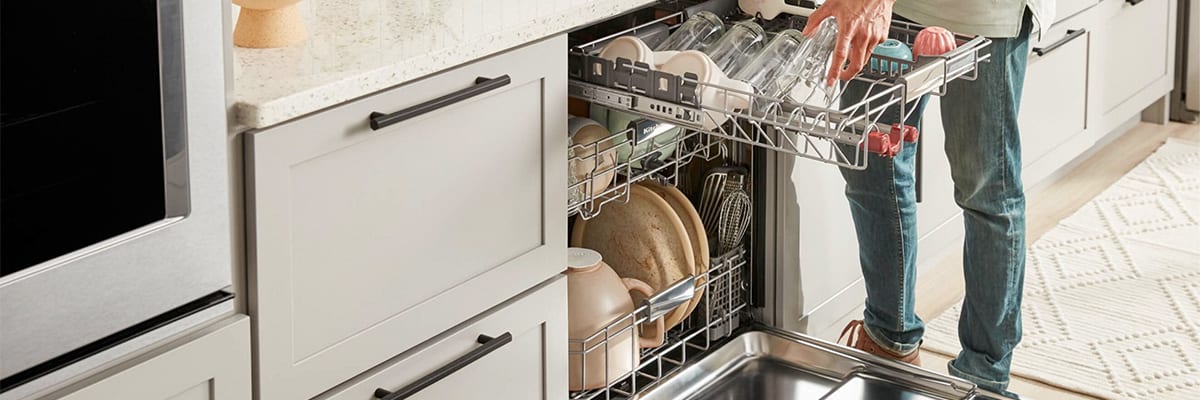
Return navigate_next
Bosch Versus KitchenAid Dishwashers
July 22, 2022 *
Bosch and KitchenAid are top brands well known and well-liked by customers. However, when pitted head-to-head, which one comes out on top for the best dishwasher? Keep reading to find out.
What is Bosch?
Bosch is a German company that has dominated the dishwasher market with super quiet, efficient dishwashers and other high-quality appliances since 1967. The company offers five different lines of dishwashers combining various features and price points.
Bosch is noted for introducing the first ultra-quiet dishwashers into the market, and quickly, all other manufacturers followed suit. Slowly, as the brand grew, it became known for reliability, drying features, and quality machines over most other dishwasher brands.

Bosch has four lines: 100 series, 300 series, 500 series, and the 800 series. As you go up in line, the price jumps, but the features get better and the quality superior. The 800 line includes Bosch’s premier models, including Wi-Fi, a water softener, crystal dry, custom finishes, and the quietest noise level.
What is KitchenAid?
KitchenAid was founded in 1919 by The Hobart Manufacturing Company. Their first product was the stand mixer which is still an iconic staple of most modern kitchens. The company started making dishwashers in 1949 and was purchased by Whirlpool in the mid-1980s.
KitchenAid is most noted for making kitchen appliances (large and small), mixers, and other home equipment. In 2016, KitchenAid branched out into making a line of food products.
Bosch Versus KitchenAid Dishwashers
When comparing Bosch versus KitchenAid dishwashers, you must consider many different factors.
Sound
First, let’s talk about quietness. Bosch made a name for itself by producing some of the quietest dishwashers available. On average, they make only 38 to 44 decibels of sound. They are so quiet they beam light onto the floor, so you know they are operating. KitchenAid dishwashers are also quiet but not as quiet as Bosch.
Efficient Cleaning
Both Bosch and KitchenAid clean dishes with the same efficiency. However, if you live in an area with hard water, consider the Bosch model that includes a water softener.

KitchenAid excels at having a lot of room to wash a ton of dishes in one cycle, and its water filtration system is stellar, removing all particles of food and debris, so your dishes come out sparkling clean.
Drying
Just as important as cleaning is the drying cycle. Often dishes come out wet with water collected in cups. However, Bosch delivers an unparalleled drying system, so all your dishes come out clean and completely dry. However, prior to 2018, that was not the case, and many customers complained about the drying component.
KitchenAid uses its patented ProDry and ExtendedProDry systems to remove moisture and sanitize the dishes simultaneously. Unfortunately, though, ProDry doesn’t beat Bosh’s CrystalDry system.
Durability/Reliability
Both brands are noted for high-quality appliances; however, in independent testing, Bosch comes out on top in terms of reliability. That does not mean that a Bosch dishwasher won’t break down or need repairs, though.
Design Options
KitchenAid and Bosch offer a few different styles to choose from. Bosch offers five style design choices, and KitchenAid offers customers four. Some even match the door style of your kitchen cabinets for a more cohesive look throughout.
Bells & Whistles
Where Bosch and KitchenAid tie is in the extras category. Some models include interior lights, a third rack, adjustable racks, Wi-Fi connectivity, and smart features. It depends on which model you purchase.

Best Bosch and KitchenAid Dishwasher Warranty
When buying a new dishwasher, you should always consider the dishwasher warranty. Most manufacturers’ warranties last only a short time and cover only manufacturing defects. That means if it breaks later, you are stuck paying for expensive parts and labor. So if you wonder if it’s worth it to purchase an extended warranty for your dishwasher, think about how just a couple of repairs could put a dent in your finances.
An Upsie extended warranty takes over where your original warranty leaves off. Some of the things an Upsie warranty covers are:
- Mechanical failure (gears, motors, ball bearings, internal tubing, computer chips, rotors, etc.)
- Electrical failure
- Drain failure
- Power issues
- Heating/cooling problems
Upsie’s warranties cost up to 70% less than warranties from competitors. Upsie has no hidden fees or charges, and Upsie’s appliances warranties don’t have deductibles.
Upsie’s claims department is open 24/7, and you can quickly and easily schedule an in-home repair. Your warranty is transferable if you sell or give away the item later. Also, you aren’t limited to a specific number of claims (like you are with other companies). You can file as many as you need up to the full price of the item.
You can purchase an Upsie warranty for large appliances bought in the last 11 months.
Learn More About Appliances:
* This article is over 6 months old and may or may not be updated.
